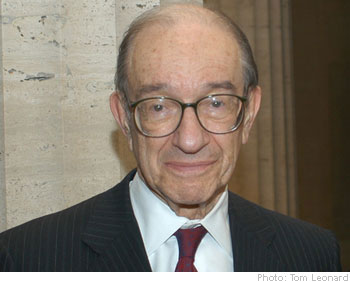 Pardon my incredulity! Alan Greenspan just taped an interview with Judy Woodruff for broadcast tomorrow and over the weekend. This Bloomberg News story quotes him saying, “They should follow the law and let them [the Bush tax cuts] lapse.” He believes it is more important at this point to cut burgeoning deficits than to funnel more money to taxpayers. In a telephone interview after the taping, Greenspan acknowledged that this “probably will” slow growth.
Pardon my incredulity! Alan Greenspan just taped an interview with Judy Woodruff for broadcast tomorrow and over the weekend. This Bloomberg News story quotes him saying, “They should follow the law and let them [the Bush tax cuts] lapse.” He believes it is more important at this point to cut burgeoning deficits than to funnel more money to taxpayers. In a telephone interview after the taping, Greenspan acknowledged that this “probably will” slow growth.
My memory of a cold night in early 1981 is still clear. Former Council of Economic Advisers Chair and Reagan adviser Alan Greenspan sat next to OMB Director Dave Stockman and CEA Chair Murray Weidenbaum and hardly uttered a word as Senate Budget Chair Pete Domenici (R-NM) urged them to ease the deficit by cutting the third year of the Roth-Kemp tax cut and to scrap “Rosie Scenario.” Stockman politely told us to get with the program, and so we helped pass the Roth-Kemp tax cuts, cutting the first year in half. The FY83 deficit peaked at a peacetime high of 6% of GDP (See CBO’s Table F-2), and we spent the next decade wrestling the deficit.
Recall also, in 2001, Fed Chair Alan Greenspan’s crucial testimony in support of the Bush tax cuts. That gave Congress the high sign that the Fed wouldn’t choke off that much fiscal stimulus.
This is another example of the adage that if you live long enough you’ll see everything, including Alan Greenspan getting religion on the federal deficit.
- Bulenox: Get 45% to 91% OFF ... Use Discount Code: UNO
- Risk Our Money Not Yours | Get 50% to 90% OFF ... Use Discount Code: MMBVBKSM
Disclaimer: This page contains affiliate links. If you choose to make a purchase after clicking a link, we may receive a commission at no additional cost to you. Thank you for your support!


Leave a Reply